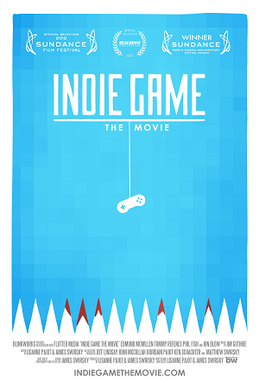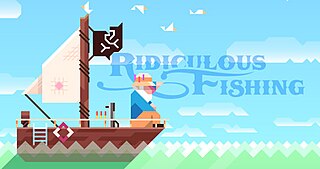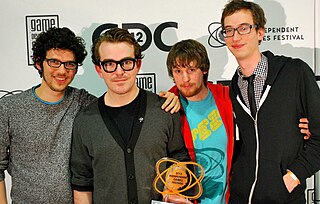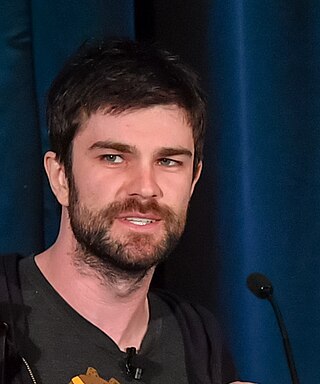
An indie game, short for independent video game, is a video game created by individuals or smaller development teams without the financial and technical support of a large game publisher, in contrast to most "AAA" (triple-A) games. Because of their independence and freedom to develop, indie games often focus on innovation, experimental gameplay, and taking risks not usually afforded in AAA games. Indie games tend to be sold through digital distribution channels rather than at retail due to a lack of publisher support. The term is analogous to independent music or independent film in those respective mediums. Since AAA only refers to a games budget, rather than a studio’s status, an indie developer is capable of producing a AAA game, although this is extremely rare. A prime example of a recent AAA game that was developed by an indie game developer, is Baldur’s Gate 3, which was developed by indie dev, Larian Stufios.

Fez is a 2012 indie puzzle-platform game developed by Polytron Corporation and published by Trapdoor. The player-character Gomez receives a fez that reveals his two-dimensional (2D) world to be one of four sides of a three-dimensional (3D) world. The player rotates between these four 2D views to realign platforms and solve puzzles. The objective is to collect cubes and cube fragments to restore order to the universe.

Kokoromi is a group with the intent of promoting video games as an art form, and experimental gameplay worldwide. The collective consists of independent videogame creators and curators Damien Quartz, Phil Fish, Heather Kelley, and Cindy Poremba. Most of the members met in 2005, working on a small game project for a cultural event in Montreal. The group was a pioneer in what came to be known as the "New Arcade".

Mojang Studios is a Swedish video game developer based in Stockholm. The studio is best known for developing the sandbox and survival game Minecraft, the best-selling video game of all time.
Trapdoor Inc. was a Canadian video game developer based in Montreal. Founded in August 2008 by Ken Schachter, the company developed Warp and co-published Polytron Corporation's Fez, both released in 2012. A third title, Heist, was cancelled after six months in development before Trapdoor was shut down in December 2012.

Starbound is an action-adventure video game developed and published by Chucklefish. Starbound takes place in a two-dimensional, procedurally generated universe which the player is able to explore in order to obtain new weapons, armor, and items, and to visit towns and villages inhabited by various intelligent lifeforms. Starbound was released out of early access in July 2016 for Windows, OS X, and Linux, and for Windows via Xbox Game Pass in December 2020.

Indie Game: The Movie is a 2012 documentary film made by Canadian filmmakers James Swirsky and Lisanne Pajot. The film is about the struggles of independent game developers Edmund McMillen and Tommy Refenes during the development of Super Meat Boy, Phil Fish during the development of Fez, and also Jonathan Blow, who reflects on the success of Braid.

Michael Bithell is a British video game designer, developer, and podcaster best known for his work on Thomas Was Alone and Volume. He is a regular host of the Play, Watch, Listen podcast, along with Alanah Pearce, Troy Baker, and Austin Wintory. He also co-hosts an evolving pop culture podcast with long time friend, British YouTuber and comedic author Daniel Hardcastle, talking about shows and movies like Star Trek, Fast and Furious, Mission Impossible and various others.

Ridiculous Fishing is a fishing video game developed and published by Vlambeer. In the game, players use motion and touch controls to catch fish and subsequently shoot them out of the sky for cash. The game was released for iOS on March 13, 2013, then later that year for Android.

TowerFall is an action indie video game created by Maddy Thorson through her company Maddy Makes Games. In the game, players control up to four archers in a multiplayer platform fighter. It was released on the Ouya microconsole in June 2013 and was later ported to PlayStation 4, Xbox One, Linux, OS X, and Windows as TowerFall Ascension and to the Nintendo Switch under its original title of TowerFall.

Cube World is an action role-playing game developed and published by Picroma for Microsoft Windows. Wolfram von Funck, the game's designer, began developing the game in June 2011, and was later joined by his wife, Sarah. An alpha version of the game was released on July 2, 2013, but saw sparse updates and communication from von Funck, with many considering the game to be vaporware until he officially released it on September 30, 2019.

Threes is a puzzle video game by Sirvo, an independent development team consisting of game designer Asher Vollmer, illustrator Greg Wohlwend, and composer Jimmy Hinson. The game was released on February 6, 2014, for iOS devices and later ported to Android, Xbox One, Windows Phone, and Windows. In Threes, the player slides numbered tiles on a grid to combine addends and multiples of three. The game ends when there are no moves left on the grid and the tiles are counted for a final score.

Adam Saltsman, also known as Adam Atomic, is an American indie video game designer best known for creating the endless runner Canabalt. He is a founder of Semi Secret Software and Finji video game studios.

Greg Wohlwend is an American independent video game developer and artist whose games include Threes! and Ridiculous Fishing. He originally formed Intuition Games with Iowa State University classmate Mike Boxleiter in 2007 where they worked on Dinowaurs and other small Adobe Flash games. Trained as an artist, Wohlwend worked mainly on the visual assets. As Mikengreg, they released Solipskier, whose success let the two take a more experimental approach with Gasketball, which did not fare as well. At the same time, Wohlwend collaborated with Asher Vollmer to make Puzzlejuice, and with Adam Saltsman to make Hundreds based on Wohlwend's first game design. He later released Threes! with Vollmer in 2014 to critical acclaim. His later games TouchTone and TumbleSeed were also the products of collaborations. Wohlwend was named among Forbes' 2014 "30 under 30" in the games industry.

Panoramical is a 2015 video game by Fernando Ramallo and David Kanaga. The player explores and manipulates 15 abstract landscapes using gamepad, mouse, joystick, or MIDI controls. The game's guest composers include Baiyon and Doseone. A Pro license of the game is marketed for professional DJs to play in public. Panoramical's development was supported by Finji, Indie Fund, and Polytron.

The high-profile and protracted five-year development of the video game Fez led to its status as an "underdog darling of the indie game scene". The 2012 puzzle-platform game built around rotating between four 2D views of a 3D space was developed by indie developer Polytron Corporation and published by Polytron, Trapdoor, and Microsoft Studios. Over the course of the game's development, Fez designer and Polytron founder Phil Fish received celebrity status for his outspoken public persona and prominence in the 2012 documentary Indie Game: The Movie, which followed the game's final stages of development and Polytron's related legal issues. The game was released to critical acclaim as an Xbox Live Arcade timed exclusive, and was later ported to other platforms. It had sold one million copies by the end of 2013.
Video game journalism is a branch of journalism concerned with the reporting and discussion of video games, typically based on a core "reveal–preview–review" cycle. With the prevalence and rise of independent media online, online publications and blogs have grown.

Zach Gage is an independent video game programmer and designer based in New York City. He is known for his iOS games, including SpellTower.
Dota is a series of strategy video games. The series began in 2003 with the release of Defense of the Ancients (DotA), a fan-developed multiplayer online battle arena (MOBA) mod for the video game Warcraft III: Reign of Chaos and its expansion, The Frozen Throne. The original mod features gameplay centered around two teams of up to five players who assume control of individual characters called "heroes", which must coordinate to destroy the enemy's central base structure called an "Ancient", to win the game. Ownership and development of DotA were passed on multiple times since its initial release until Valve hired the mod's lead designer IceFrog and after an ongoing legal dispute with Blizzard Entertainment, the developer of Warcraft III, brokered a deal that allowed for Valve to inherit the trademark to the Dota name.


















